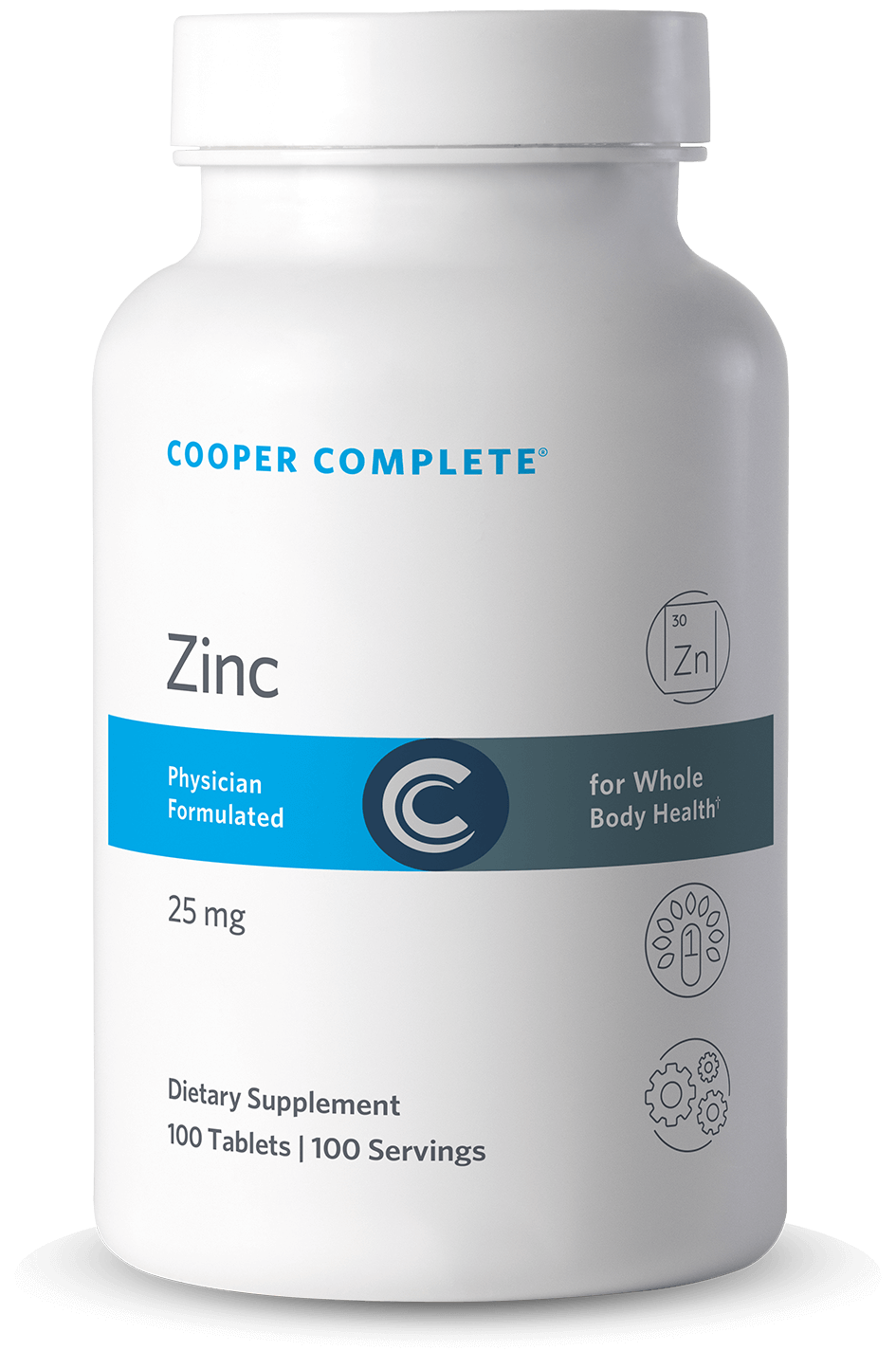COVID-19: The Zinc Link

From chicken noodle soup to herbal teas to over-the-counter medications, many patients and health care providers alike are always on the hunt for remedies to prevent or shorten the duration of the common cold. In fact, it was serendipity that brought zinc supplementation to the attention of medical researchers as a candidate for cold symptom relief. This has led researchers to investigate if zinc has a similar effect on COVID-19.

Zinc Supplement 25 mg
This Zinc Supplement is comprised of zinc gluconate and zinc citrate for optimal absorption. Zinc is important for muscle function, healthy aging, skin and immune health.
$20.48 Add to cartZinc’s Effect On The Common Cold
It all started 40 years ago with a clinical observation made by a physician who was treating a pediatric cancer patient undergoing chemotherapy who also suffered from frequent severe colds. The physician had initially prescribed dissolvable zinc tablets to treat the patient’s zinc deficiency and stimulate immune responsiveness, but later found it to relieve their cold symptoms.
The physician joined forces with two intrepid investigators from Austin, Texas, utilizing local media to invite sneezing, coughing and sniffling individuals to volunteer for a clinical trial that tested the effect of oral zinc on the duration of the common cold. Participants consumed dissolvable zinc tablets every 2 hours during the day until their symptoms subsided. After seven days, 86% of the 37 zinc-treated subjects were asymptomatic compared to only 46% of the 28 placebo-treated subjects.
Since that time, a number of clinical trials have been conducted with varying results. This may have been due to differences in the study population, the duration of symptoms before the initiation of supplementation or the dose and frequency of zinc use. A recent meta-analysis detailed the results pooled from six clinical trials of zinc supplementation versus placebo. It found zinc supplementation to reduce the duration of cold symptoms by an average of 2.25 days.
Zinc And Immune Health
Studies in basic science have shown the importance of zinc for the maintenance and development of critical components of both our innate and adaptive immune systems. Our innate immune system response to a disease-causing invader or a pathogen is relatively generic but rapid. Our adaptive immune response is more specific to the pathogen. This includes a direct attack by T cells, or T lymphocytes, and the production of specific antibodies from B lymphocytes directed at the specific pathogen.
Given the importance of zinc in maintaining normal function of the immune system, it is not surprising there has been great interest in determining if zinc could shorten the duration of COVID-19 illness as well. Currently, there are a number of ongoing clinical trials evaluating the impact of zinc supplementation on the prevention and treatment of COVID-19.
Preventing Zinc deficiency
Zinc deficiency impairs bone marrow function, decreasing the number of immune precursor cells that develop into these helpful B and T lymphocytes. Zinc deficiency also increases pro-inflammatory cytokine concentrations. Excessive production of inflammatory cytokines has been linked to short-term tissue damage during acute illness. However, prolonged production of inflammatory cytokines has been associated with the development of chronic diseases, such as atherosclerosis and cancer.
Zinc is the second most abundant trace mineral in the body (after iron) and is essential for a number of cellular processes in the body. Unlike iron, the human body doesn’t keep a store of zinc in the body. Unfortunately, zinc levels are difficult to measure accurately as zinc is distributed across various cellular components. The best way to assess whether you are getting enough zinc is to take a closer look at your diet. Refer to the table below to see the recommended dietary allowances (RDAs) for zinc.
Table 1: Recommended Dietary Allowances (RDAs) for Zinc |
||||
|---|---|---|---|---|
| AGE | MALE | FEMALE | PREGNANCY | LACTATION |
| 0-6 months | 2 mg* | 2 mg* | ||
| 7-12 months | 3 mg | 3 mg | ||
| 1-3 years | 3 mg | 3 mg | ||
| 4-8 years | 5 mg | 5 mg | ||
| 9-13 years | 8 mg | 8 mg | ||
| 14-18 years | 11 mg | 9 mg | 12 mg | 13 mg |
| 19+ years | 11 mg | 8 mg | 11 mg | 12 mg |
| *Adequate Intake (AI) | ||||
Oysters contain more zinc per serving than any other food, but red meat and poultry provide the majority of zinc in the American diet. Other ideal food sources of zinc include:
- Beans
- Nuts
- Seafood such as crab and lobster
- Whole grains
- Fortified cereal
Some evidence suggests that zinc intake among older adults may be inadequate. An analysis of NHANES III data found that 35–45% of adults age 60 years or older had zinc intakes below the estimated average requirement of 6.8 mg/day for elderly females and 9.4 mg/day for elderly males.
Certain individuals may be at an increased risk of having suboptimal zinc levels, including:
- Pregnant and lactating women
- Those with gastrointestinal disorders such as ulcerative colitis or Crohn’s disease
- Vegetarians
- People with chronic kidney or liver disease
- Individuals with diabetes, sickle cell disease or cancer
- People who consume alcohol excessively
- Those taking certain kinds of diuretic medications
Supplemental zinc may be beneficial in the setting of insufficient dietary intake or stages in specific diseases.
Too much of a good thing
There are also possible health risks from consuming too much zinc. Acute adverse effects of high zinc intake can include nausea, vomiting, loss of appetite, abdominal cramps, diarrhea and headaches. High levels of zinc intake of more than 150 mg per day can inhibit copper absorption resulting in copper deficiency. Copper deficiency can lead to irreversible damage to the nervous system and low blood counts.
Table 2: Tolerable Upper Intake Levels (ULs) for Zinc |
||||
|---|---|---|---|---|
| AGE | MALE | FEMALE | PREGNANCY | LACTATION |
| 0-6 months | 4 mg | 4 mg | ||
| 7-12 months | 5 mg | 5 mg | ||
| 1-3 years | 7 mg | 7 mg | ||
| 4-8 years | 12 mg | 12 mg | ||
| 9-13 years | 23 mg | 23 mg | ||
| 14-18 years | 34 mg | 34 mg | 34 mg | 34 mg |
| 19+ years | 40 mg | 40 mg | 40 mg | 40 mg |
Zinc supplements may interact differently with various drugs, including antibiotics, such as quinolones, tetracyclines, and penicillamine, a drug used to treat rheumatoid arthritis. The use of zinc nasal sprays have also been associated with permanent loss of smell.
While it is still unclear if zinc plays a significant role in the prevention and treatment of COVID-19 specifically, we know that zinc plays an important role in immune function in general. There is no time like the present to take a closer look at your diet to ensure you are not at risk for zinc deficiency. Cooper Complete® Zinc supplement contains 25 mg of zinc in the gluconate and citrate form, to support optimal absorption. All Cooper Complete multivitamins also contain 15 mg of zinc.
As a reminder, your physician understands your health profile best, so it’s important to talk to him or her about which supplements are best for you.
Article provided by Nina B. Radford, MD, Cooper Clinic Cardiologist and Director of Clinical Research.
